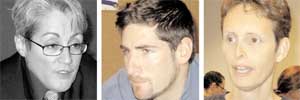-
- Florida Senate candidate denounces reports that he is gay
- Gephardt’s lesbian daughter will campaign full time
- United Church of Christ professor says Jesus was actively gay
- GenderPAC unites theory and lobbying for equality in D.C.
- Jesuit schools create gay-supportive ‘Ally’ program
- Gay couple with quadruplets expecting again
- Catholic award denied to lesbian educator in Minneapolis
- National News Briefs
- World News Briefs
national
GenderPAC unites theory and lobbying for equality in D.C.
Transgender leader says Americans ready to see gender as a civil rights issue
Published Thursday, 29-May-2003 in issue 805
The 3rd National Conference on Gender drew more than 1400 people to Washington, D.C., May 17-19, for a lively mix of academic and practical discussion, as well as congressional lobbying. The number of attendees was “up dramatically from last year,” said Riki Wilchins, executive director of GenderPAC, which organized the event.
American society is “at a juncture where people are ready to start considering gender as a civil rights issue,” she said. “They are no longer seeing it as this fringe thing but something that impacts almost everyone. Gender stereotyping is something that everyone is familiar with.”
“I talk to PTA moms in Georgia who recognize it’s a problem for a six-year-old son who likes books instead of girls. If we can get those people talking to gay people, talking to trans people, talking to teens of color, I think that is a really powerful coalition to put this issue on the map.”
Congressional lobby days followed the weekend conference. The visits this year focused on urging members to sign a diversity statement based on individual gender identity expression or sexual orientation in their own employment practices. It is a joint effort with the Human Rights Campaign.
“We think that is really critical if we are going to start to look at gender language in bills like ENDA [Employment Non-Discrimination Act] or the hate crimes bill,” said Wilchins.
“And violence against teens is a huge problem. We’ve been tracking them, and five of eight are against teens of color” who are poor. “Clearly there is an intersection between race, and class, and age, and gender that puts people at special risk. I don’t see this really being discussed.”
It was also noted at the conference that kids are coming out and transitioning at an earlier age. “Gender is a subtext in a lot of things that are going on in teen-on-teen violence,” said Wilchins. GenderPAC is starting chapters on a dozen different college campuses, and has begun to discuss how to begin to provide resources for younger people and their families.
One of the most provocative panels discussions at the conference asked the question: “Who owns gender rights?” “We own gender,” said James Dale, the activist who gained notoriety in challenging the antigay policies of the Boy Scouts of America. In the gay male community, “a lot of it is body image.” He said the real change in perception of gender bubbles up from the bottom, “The top responds to the masses.” He urged people to take control of their own gender identity.
“No one owns gender, the whole idea of ownership is a little crazy,” said long-time feminist leader Ellie Smeal. “The most important thing in making change is not money, it’s not numbers. What does matter is ideas and the strength of the ideas. I have watched very, very few people make profound changes with no money and few numbers. But the strength of that idea caught on.”
“Making political change is essential,” she added. “Sometimes change does follow behavior.”
Smeal called gender rights a matter of social justice that arose out of the civil rights and feminists movements and is a continuation of those struggles. She railed against the “increasingly intolerant atmosphere” created by the Bush administration.
Wilchins, as moderator of the panel, observed that much of the focus of gender identity has shifted from mannerisms, expression and dress to ones of body image, surgery and hormones.
New York activist Carmen Vazquez expressed her “utter fed-up-ness with all kinds of identity politics,” yet identified herself as a Puerto Rican lesbian feminist socialist.
“All human beings have the right to claim and express gender however they fucking well please,” Vazquez shouted. “The big problem of gender identity as we have used it is that it is reductive. [We need to put it within the context] of the larger struggle for social and economic justice.”
Vasquez called a strategy of political bipartisanship “absurd. Without engaging in regime change at home, the discussion is at an end.… We cannot tolerate another four years of Bush.”
|
|
Copyright © 2003-2025 Uptown Publications


